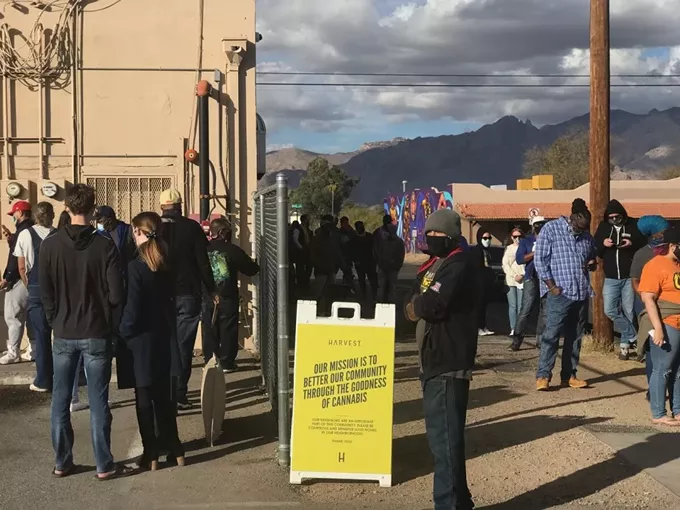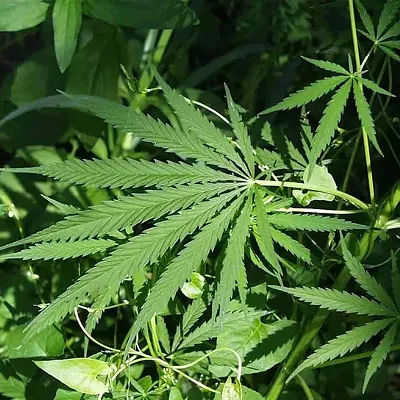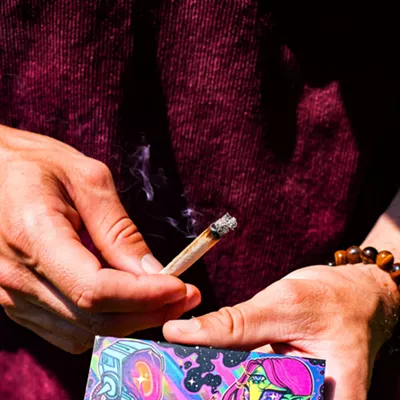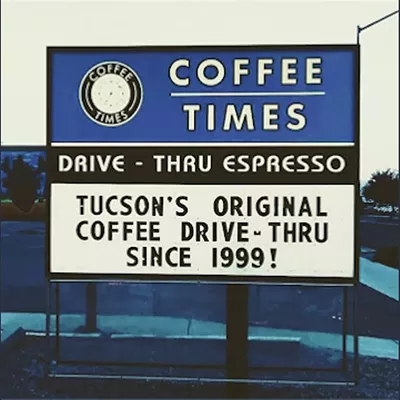Outside midtown's Harvest cannabis dispensary, Sammy Magro said she had no problem standing in line to get legal THC cartridges instead of purchasing them off the black market as she had done for years. It was a sunny day in the low 70s and the line was moving quickly, so Magro didn't mind the wait, she said.
"I'm excited about this. It's my first time buying legally," Magro said. "I'm looking for cartridges today because it's better than getting them off the street because they're pure."
Bryce Hill said he has bought recreational marijuana in other legal states and he was glad adult-use sales had finally come to Pima County because of the tax benefits.
"I think it's going to benefit the community because it's taxed pretty heavily," Hill said. "I forgot the exact numbers, but like Colorado, when they first legalized it they got massive amounts of money."
Others in the line would only give their first name—either due to the ongoing stigma of being associated with marijuana usage or a need for privacy. Charles X said he thought recreational marijuana was a very useful thing for the community to have, especially during a pandemic.
"I've lived in Oregon before, so recreational legal marijuana for the citizenry is nothing new to me," Charles X said. "But I think it's an excellent alternative to many of the substances people have turned to for stress relief during the pandemic."
The customers outside Harvest, 2734 E. Grant Road, were just a few of the thousands of Tucsonans who have been standing in line, sometimes for hours, for the chance to purchase recreational weed. Once inside the dispensaries, customers are discovering not only high-quality cannabis buds, but also a variety of marijuana extracts that can be smoked, eaten or applied to their bodies in the form of pain-relieving lotions.
The rush started on Friday, Jan. 22, when Harvest opened its doors to recreational customers.
Steve White, the owner of 15 Harvest dispensaries throughout Arizona, said he wasn't expecting recreational sales to happen as soon as they did, but as the owner of the largest chain in the state, he had the staff and inventory to be ready for it.
"We hired in advance of this, we knew this was we wanted to be prepared," White said. "We wanted to open as quickly as we could. We wanted to get recreational cannabis to customers the minute we're able to do it."
White has built his empire since voters first approved the state's medical marijuana program in 2010. In the years since then, he's steadily bought out licenses and opened shops in Avondale, Baseline, Casa Grande, Chandler, Cottonwood, Glendale, Havasu, Mesa, Peoria, Phoenix, Scottsdale and Tempe. He was also the largest single contributor to 2020's Prop 207 campaign, kicking in $1.8 million of nearly $6 million raised for supporters.
White had the Tucson market cornered for a few days, but in less than a week, two more dispensaries had expanded from serving medical patients to the general public, Desert Bloom Re-Leaf Center at 8060 E. 22nd Street and north-central Bloom on Oracle Road. (Despite their similar names, the two dispensaries are separate from each other; Desert Bloom Re-Leaf Center is locally owned by Aari Ruben, while Bloom is part of chain that includes outlets in Phoenix, Sedona and Peoria in addition to Phoenix.
Other dispensaries are preparing to open to recreational sales in the coming weeks, but they face a variety of hurdles.
Moe Asnani, who owns the Downtown Dispensary at 221 E. Sixth Street and D2 at 7105 E. 22nd St., says he hopes to open to recreational sales soon, but has to take a number factors into consideration, such as social distancing and availability of product.
Asnani said that his main holdups are space and inventory. Employees now also have to be licensed to sell recreational weed.“We're hiring as much as we can," Asnani said. "It doesn't take very long, though, because of the electronic system already in place."
Brian Warde says his two Prime Leaf locations, at 4220 E. Speedway and 1525 N. Park Ave., expect to be open in March.
Warde, co-owner and CEO of Prime Leaf, wants to be sure his employees and patients are as safe as possible, given the continued ravages of the coronavirus.
Citing space issues and inventory management—with the additional need for testing medicinal products due to a law that went into effect last November—Warde said last week he was going to take some time for his adult-use rollout in order to address public and employee safety during the COVID pandemic.
He also wants to ensure the patient experience does not suffer because he rushed the move into recreational sales.
"We want to give patients what they have come to expect, and not allow the adult-use market to alter our patients' experience," Warde said last week as the adult-use market frenzy began. "We're slow rolling it to make sure we are in the best possible position to meet everyone's expectations."
Earth's Healing, with two locations at 78 W. River Road and 2075 E. Benson Highway, expects to start recreational sales "the week of Feb. 5," according to Flo Hizazi, a spokesperson for the company.
The Green Halo's Victoria Poulus says the dispensary at 7710 S. Wilmot Road plans to launch recreational sales in April.
Marana's two dispensaries are moving to open as well. Nature Med, 5390 W. Ina Road, has a set a target date of Feb. 25. However, it may longer before Botanica, 6205 N. Travel Center Drive, opens their doors to the recreational customer.
Owner Bryan Hill said it's dependent on how fast he can prepare his staff for adult-use transactions, especially while COVID cases remain high in the county. He said he wants to make sure his staff is knowledgeable and prepared before Botanica announces a date.
"We're not in the business of doing anything half-heartedly or not fully contemplated, so there's a component of staff training we need to do, as well as some technologies we need to figure out before we're ready," Hill said. "That could be as soon as the middle of February, or maybe it's as late as the middle of March. It really just depends on how comfortable me and my management staff feel we're doing this in the absolute most legal way."
Hill is anticipating long lines of customers once his dispensary does begin adult-use sales, but said he believes those lines will be temporary due to customer inquisitiveness and other county dispensaries starting their adult-use sales programs.
"When the first In-and-Out Burger opened up, people lined up for 12 hours for a hamburger," Hill said. "I think there's going to be a natural curiosity about it at the beginning. But we're building up our infrastructure and managing our staffing levels to anticipate an increase in business."
The rush hasn't come without problems. Outside Harvest last week, a neighborhood resident named George— who withheld his last name due to privacy—was walking back to his home after surveying the scene outside the dispensary. George said he was upset about the recent influx of Harvest's customers taking over the streets he has lived on for over the past 30 years,
George said that Harvest "should not be here. It should be in some plaza or shopping center. It gets too much traffic going by and my neighbors are unable to walk their dogs because cars are blocking the sidewalk. It's too chaotic now."
In an effort to deal with the hundreds of complaints from nearby residents, the city dispatched a Park Tucson staffer to repaint red "No Parking" markings on the curbs.
An unmasked Park Tucson employee was wrapping up his day painting the curbside along Treat Street, near Grant Road. The employee declined an interview. "I've never liked scumbag journalists," he said.
Ward 6 Councilmember Steve Kozachik said he has received hundreds of phone calls and emails with complaints from nearby residents about cars blocking sidewalks and driveways and guns being pulled on neighborhood residents for confronting those parked illegally.
"This is not about 'don't sell pot.' This is about treating people with a little bit of respect," Kozachik said. "I walked by there a couple of times a day to get to and from work and two nights ago I saw people parking on the sidewalk, in front of a fire hydrant and in the wrong direction."
Kozachik said the city was not adding new red zones to the area, but only updating areas where it's already illegal to park along Treat Street and the surrounding neighborhood. He added the dispensary is trying to help alleviate the situation by hiring security to monitor the area and are using a vacant lot near The Bayhorse Tavern for overflow parking.
But more could be done on the city's end to help fix the problem, according to the council member. He said a big part of the problem is the city's restrictive land-use conditions that were put into place after medical marijuana was legalized in 2010. Kozachik said he would like to see those conditions changed so dispensaries like Harvest could relocate to a shopping center.
"Right now, we have vacant storefronts all over town that have a boatload of parking and are the appropriate size for places like this," Kozachik said. "We as a city have to do better than this by the residents, in terms of managing what's happening around the place because we know the impact it has.
Since mid-October, municipalities including Sahuarita, Marana and Oro Valley have moved to limit adult-use sales in their respective jurisdictions. But the City of Tucson is working to update its zoning ordinances to help the industry flourish and increase economic activity.
Discussions about updates to the Unified Development Code Related to Medical and Adult Use Marijuana Dispensaries began in August as Tucson City Council wrestled with an emergency resolution to accommodate health department COVID-19 pandemic protocols for social distancing in Tucson dispensaries.
In the wake of a stakeholder meeting in mid-October, COVID-related temporary measures were adopted by the city to help with social distancing, and included curbside pickup and delivery, home delivery and expanded lobby size.
The measures allow for the utilization of unused space to expand lobbies, on a site-by-site basis, and also allows for the use of drive-throughs where they exist in buildings that have been converted to dispensary use.
Current zoning limits dispensaries to 4,000-square feet with one-quarter of that devoted to lobby space.
An additional stakeholder meeting in December sought feedback for code updates the Planning and Development Services Department has been tasked to achieve by April.
Key items that will be considered for amendment will include parking, dispensary size, lobby size, layout, dual-use facilities and drive-thrus.
To that end, the Planning Commission has scheduled a series of meetings and study sessions, the latest of which took place on Jan. 27, for updated regulations that will make their way to city council at the end of March.
Among the changes proposed are increasing the maximum size of a dispensary from 4,000-square-feet to 10,000-square-feet, removing restrictions on drive-thrus for marijuana facilities and amending the ordinance to reflect the new reality of legalized adult use.
There is a planning commission public hearing scheduled for Feb. 17 and council has scheduled a public hearing and review of the amendments on March 23. Details can be found at tucsonaz.gov.
"We will be reviewing our zoning regulations for dispensaries to address the new world recreational pot sales have created for us," Kozachik said. "Right now our rules are restrictive, which means some locations such as an empty storefront in a shopping mall that has a ton of parking may not qualify. We need to take a hard look at easing up some of the rules so these places are not effectively forced into inappropriate locations such as this one on Treat. Even with medical pot only, Harvest has always been a traffic/crowd problem."
Prop 207 allows local jurisdictions to create their own rules around recreational weed, but they are not allowed to create ordinances more restrictive than what is currently allowed for medical dispensaries.
Several towns have already clamped down on recreational sales and will only allow dual-use licenses now that Prop 207 has passed.
Sahuarita enacted a town-wide ban on new dispensaries in late October, allowing Hana Meds to be the only adult-use dispensary in town.
Likewise Oro Valley and Marana have banned single-use marijuana establishments, but Marana will allow Botanica and Nature Med to sell recreational cannabis once they receive dual licenses.







